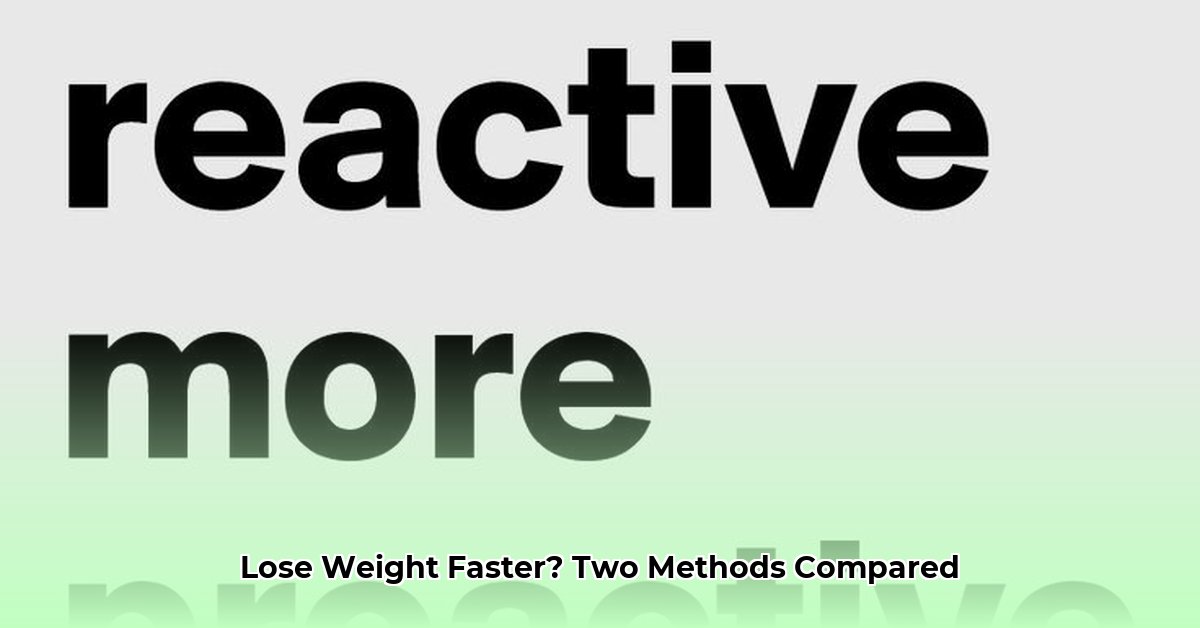
Choosing a weight loss strategy can feel overwhelming. This guide compares two popular approaches: Proactive Medical Weight Management and ProActive Nutrition. We'll break down each method, highlighting the pros and cons to help you choose the best path for your unique needs and goals. Remember, sustainable weight loss is a journey, not a race.
Proactive Medical Weight Management: A Doctor-Guided Approach
This method often combines prescription medication with a personalized diet and exercise plan, closely monitored by a physician. It's like having a dedicated healthcare team supporting your weight loss journey.
How it Works:
- Comprehensive Assessment: Your doctor will conduct a thorough evaluation, assessing your overall health, potential risks, and weight loss goals.
- Personalized Diet Plan: A registered dietitian will create a tailored eating plan, often focusing on calorie control and macronutrient balance (proteins, carbohydrates, fats).
- Medication (If Necessary): Your doctor might prescribe appetite suppressants or metabolism-boosting medications. These medications are not always necessary and are carefully considered based on individual needs and health factors.
- Regular Monitoring: You'll have regular check-ups to monitor progress, manage potential side effects (if any), and adjust the treatment plan as needed. This consistent monitoring is crucial for safety and efficacy.
Advantages:
- Potentially Faster Results: Medical intervention can lead to quicker initial weight loss compared to lifestyle modifications alone. However, this is not always the case.
- Expert Guidance: Regular medical supervision provides support, adjustments, and management of potential health complications.
Disadvantages:
- Side Effects: Medications can have side effects, ranging in severity. Your doctor will discuss these thoroughly.
- Cost: Medical visits and prescriptions can be expensive.
- Limited Address of Root Causes: This approach may not fully address underlying emotional or behavioral factors contributing to weight issues.
ProActive Nutrition: A Holistic Lifestyle Transformation
This approach emphasizes long-term, sustainable lifestyle changes. It's about building healthy habits around diet, exercise, and stress management, focusing on lasting changes rather than quick fixes.
How it Works:
- Habit Identification: Start by identifying your eating patterns, triggers, and potential obstacles to healthy habits.
- Gradual Dietary Adjustments: Gradually incorporate healthier food choices, focusing on small, manageable changes. This might include swapping sugary drinks for water or adding more fruits and vegetables to your meals.
- Enjoyable Physical Activity: Find physical activities you genuinely enjoy and can sustain long-term. This could be anything from yoga to walking to dancing.
- Stress Management: Learn effective stress management techniques, such as meditation, deep breathing exercises, or spending time in nature. Stress significantly impacts weight management.
- Seek Support: Consider working with a registered dietitian or personal trainer for personalized guidance and support. External support can be invaluable throughout this process.
Advantages:
- Long-Term Sustainability: Healthy habits established through this approach are more likely to be maintained long-term.
- Holistic Approach: This method addresses the emotional and behavioral aspects of weight management, contributing to overall well-being.
- Avoids Medication: This approach avoids the potential risks and side effects associated with medications.
Disadvantages:
- Slower Progress: Weight loss may be slower than with medically supervised programs.
- Self-Discipline: Requires a significant commitment to self-discipline.
- Potential Costs: Working with professionals (dietitians, trainers) increases costs.
Comparing the Approaches: Which is Right for You?
This table summarizes the key differences:
| Feature | Proactive Medical Weight Management | ProActive Nutrition |
|---|---|---|
| Speed of Weight Loss | Potentially faster initial weight loss | Usually slower but more sustainable long-term |
| Medical Supervision | High – regular doctor visits | Low or none unless working with professionals |
| Cost | Typically higher (medication, appointments) | Varies depending on professional support needed |
| Sustainability | Depends on continued adherence | Higher potential for long-term success |
| Side Effects | Potential side effects from medication | Generally lower risk |
Choosing the Best Weight Loss Strategy
The best approach depends on your individual needs, preferences, and health status. Ask yourself:
- What are my health goals and priorities?
- What is my budget?
- How much time can I realistically dedicate?
- Am I comfortable with medication?
- Do I prefer structured programs or more flexibility?
A consultation with your doctor or a registered dietitian is crucial. They can provide personalized recommendations based on your unique circumstances. Don't hesitate to seek their expert guidance.
Maintaining Long-Term Weight Loss Success
Regardless of your chosen method, remember that lasting weight management requires ongoing effort. Focus on:
- Sustainable Lifestyle Changes: Gradually incorporate healthy habits into your daily routine.
- Regular Exercise: Find activities you enjoy and can maintain long-term.
- Mindful Eating: Pay attention to your hunger and fullness cues.
- Stress Management: Prioritize stress-reducing techniques.
- Ongoing Support: Consider support groups or professional guidance to stay motivated.
Remember, a proactive approach to weight loss is a journey, and finding the right path for you is the first step towards a healthier, happier you.